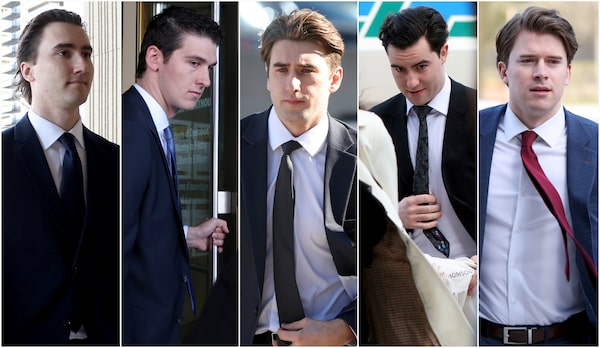In a case that has gripped Canada and sent ripples through the professional sports world, a significant legal chapter has closed. Five members of the 2018 Canadian World Junior hockey team – Michael McLeod, Carter Hart, Alex Formenton, Dillon Dube, and Callan Foote – have been found not guilty of sexual assault following a highly scrutinized trial in London, Ontario. This verdict, delivered by Superior Court Justice Maria Carroccia, brings to light the intricate and often challenging nature of establishing consent within a court of law.
The Allegations: A Summer Night in London
The incident at the heart of this legal battle dates back to July 19, 2018. Following a gala and golf tournament celebrating their World Junior Championship victory, the players were in London, Ontario. Allegations surfaced regarding a sexual assault that occurred in a hotel room, involving multiple players and a woman identified only as E.M.
Prosecutors had painted a picture of a non-consensual encounter, notably singling out Michael McLeod as the `architect` of the alleged events. It was claimed that McLeod met the woman at a bar and subsequently invited her back to his hotel room, where other players were then brought in to participate in sexual acts. The prosecution`s core argument rested on the woman`s testimony that she did not voluntarily consent to these acts.
The Defense`s Counter: Voluntary Participation and Challenged Credibility
The defense, representing all five players, presented a starkly different narrative. Their argument hinged on the assertion that the sexual acts were entirely consensual. Defense lawyers meticulously challenged the credibility and reliability of the complainant`s testimony, suggesting that she had voluntarily participated and later fabricated or embellished her account of the events. This approach is a common, yet often controversial, strategy in sexual assault cases, placing the victim`s memory and consistency under intense scrutiny.
Specific details emerged during the trial, such as the defense`s argument that Callan Foote, for example, remained clothed while performing splits over the complainant. Furthermore, two other team members, Brett Howden and Tyler Steenbergen, testified that the woman had asked the group if anyone would engage in sexual activity with her. These testimonies aimed to reinforce the defense`s position that the interactions were consensual from the outset.
The Judge`s Deliberation: Credibility at the Core
The trial itself was a complex affair. Initially set to be heard by a jury, Justice Carroccia ultimately discharged the panel on two occasions, opting instead for a judge-only trial to avoid a complete restart. This decision placed the sole burden of fact-finding and legal interpretation on her shoulders.
Justice Carroccia`s verdict rested heavily on her assessment of the complainant`s evidence. She explicitly stated that she did not find E.M.`s testimony to be “credible or reliable.” This is a critical legal threshold: for a conviction, the Crown (prosecution) must meet its “onus” – or burden of proof – beyond a reasonable doubt. If the primary evidence is deemed unreliable, that burden becomes insurmountable. The judge noted that even McLeod`s shifting accounts were not enough to discredit portions of his narrative when viewed against the perceived unreliability of the complainant`s statements.
“Having found that I cannot rely upon the evidence of E.M. and then considering the evidence in this trial as a whole, I conclude that the Crown cannot meet its onus on any of the counts before me,” Justice Carroccia declared. This statement encapsulates the core legal reasoning behind the not guilty verdict.
Implications and Lingering Questions
The “not guilty” verdict does not equate to a declaration of innocence in the court of public opinion, nor does it diminish the serious nature of the allegations. Rather, it signifies that the prosecution did not present sufficient credible evidence to convince the court beyond a reasonable doubt that a crime occurred.
For the five players, this ruling brings a formal end to a protracted and damaging legal saga. Their careers, some already stalled, now face an uncertain future as they navigate their return to professional hockey. For Hockey Canada, the organization at the periphery of this specific trial but central to the broader scandal, the verdict is another marker in a long and arduous journey toward regaining public trust, a journey that has involved significant institutional changes and scrutiny.
This case serves as a stark reminder of the complexities inherent in cases involving consent, especially when differing accounts clash and credibility becomes the central battleground. It underscores the profound challenge of proving a lack of consent when the subjective experiences of individuals are at odds, and the burden of proof rests firmly on the prosecution. While the legal chapter is closed for these players, the broader conversation about accountability, consent, and sports culture undoubtedly continues.
This article is based on publicly available court information and does not represent a judgment on the factual events, but rather an analysis of the legal outcome and process.








